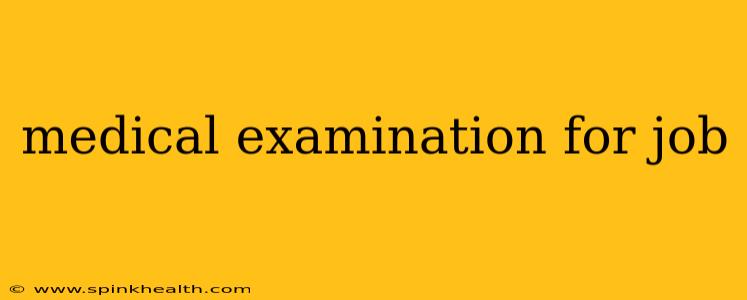The dreaded medical examination. For many, the words conjure up images of sterile rooms, nervous anticipation, and a whole lot of paperwork. But understanding what to expect can significantly ease the anxiety and help you approach your pre-employment medical check-up with confidence. This isn't just about ticking boxes for the employer; it's about ensuring your health and safety in the workplace, and ultimately, your suitability for the role.
Let's unravel the mysteries surrounding job-related medical examinations. We'll explore the common procedures, address frequently asked questions, and empower you to navigate this process with ease.
What is a Pre-Employment Medical Examination?
A pre-employment medical examination is a health assessment conducted before you begin a new job. The specifics vary widely depending on the industry, the role, and the employer. Some roles require a thorough check-up, while others might only involve a simple check of your physical fitness. Imagine it as a compatibility check – does your health profile align with the demands of the job?
Think of it this way: a construction worker needs different physical capabilities than an office administrator. A medical examination helps ensure you're physically and mentally fit for the specific tasks and environments of the position. This protects both you and the employer. It helps prevent workplace accidents and ensures you can perform your duties effectively.
What Happens During a Pre-Employment Medical Examination?
The exact nature of your medical exam will depend on the job. However, some common procedures include:
- Physical Examination: This usually includes checking your height, weight, blood pressure, heart rate, and listening to your lungs and heart.
- Vision and Hearing Tests: These assessments check your visual and auditory acuity, crucial for many roles.
- Drug and Alcohol Screening: This is increasingly common in many industries, particularly those involving safety-sensitive roles. This aims to ensure a safe work environment for everyone.
- Blood Tests: These may be conducted to check for various health markers, depending on the job requirements.
- Urine Tests: Like blood tests, these can detect various health conditions or substances.
- Mental Health Assessment: Depending on the nature of the job, a basic psychological assessment might be conducted. This isn't about diagnosing mental illness; rather, it's about assessing your ability to handle workplace stress and maintain emotional stability.
What if I have a Pre-Existing Medical Condition?
H2: What if I have a pre-existing medical condition?
This is a crucial question. Honesty is vital. Disclosing pre-existing conditions during the application process or the medical examination is paramount. Withholding information could jeopardize your employment and potentially harm your health. Your employer needs this information to assess your fitness for the role and to make appropriate accommodations, if necessary. It’s a chance for you to discuss any reasonable adjustments that might enable you to perform the job effectively.
What are the Legal Aspects of Pre-Employment Medical Examinations?
H2: Are pre-employment medical exams legal?
Yes, pre-employment medical examinations are generally legal, but there are important regulations in place to protect your rights. Employers must adhere to laws regarding privacy and the use of medical information. They cannot ask for irrelevant health details and are obligated to keep your information confidential. Legislation around this differs geographically, so always check your local laws.
Can I Refuse a Pre-Employment Medical Examination?
H2: Can I refuse a pre-employment medical examination?
You generally have the right to refuse a pre-employment medical examination. However, keep in mind that refusing might lead to the employer withdrawing the job offer. The employer's right to request a medical examination usually stems from a legitimate business need (such as safety concerns), and it must be relevant to the job.
What is the Purpose of Drug and Alcohol Testing?
H2: Why are drug and alcohol tests included in pre-employment medicals?
Drug and alcohol testing aims to create a safe and productive work environment. It's particularly important in industries where impairment could lead to accidents or injuries. These tests are often part of a broader commitment to workplace safety and health.
How Long Does a Pre-Employment Medical Examination Take?
H2: How long does a pre-employment medical take?
The duration of a pre-employment medical examination varies greatly. A basic assessment might take only an hour, while a more comprehensive one might last several hours. Some tests, like blood tests, may require additional time for processing the results.
What Should I Do to Prepare for a Pre-Employment Medical Examination?
H2: How can I prepare for my medical examination?
Adequate preparation can greatly reduce stress. Get a good night's sleep, eat a healthy meal beforehand, and bring any relevant medical records or information about pre-existing conditions. Honesty and open communication with the medical professional are essential.
Navigating the world of pre-employment medical examinations can seem daunting, but with informed preparation and open communication, it becomes a manageable step in your career journey. Remember, it’s a process designed to ensure your well-being and suitability for the job. By understanding the process and your rights, you can approach the examination with confidence and clarity.

